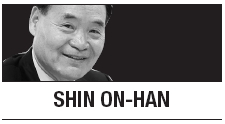A total of 167,000 Korean children were adopted by families in the United States, Europe and other nations after the Korean War. During this period, it seemed to be much better for them to grow up outside of Korea. I thought that it would be good for them. In fact, some of the early adoptees have become successful government officials, members of congress or famous sports stars.
However, my thinking has changed through meeting the overseas adoptees and reading the books they wrote. I totally overlooked their sorrows as they’ve had to grow up in unfamiliar circumstances.

Let’s consider an example. If a child was born and raised in a foster family for a year, then adopted by a U.S. family, he would feel shocked and confused by the culture differences, including the language barrier.
As he grows up, he realizes his appearance is different from his brothers, sisters and parents, with their different nose shapes, skin color and hair color. He gets in trouble more often after entering school. As he looks different from all of the other students, he becomes isolated. He may not want to go to school. Naturally, the quality of his work is poorer than the others. According to studies, if born and raised in his mother country for a year then sent to a different environment, he will have trouble with his studies and language learning. Even if the adoptees get over their hardship, they never forget what they have been through.
A few years ago, a homeless person was found who looked completely Korean but didn’t understand Korean at all. He was a Korean adoptee deported from the U.S. because he had committed a crime. He was adopted 40 years ago but never received U.S. citizenship. If his adoptive parents had applied for it six months after the entry procedure, he would have gotten his U.S. citizenship two years afterwards. However, the adoptive parents didn’t pay attention to that. In the U.S., when foreign people commit a crime, they either have to serve time in prison or be deported. He chose to be deported. But he couldn’t do anything in Korea because of the language barrier. He became homeless. Some have been put in prison after being deported to Korea.
What responsibility should Korea take for these people?
What if a parent gave up four of five children for adoption because he couldn’t feed all of them? After that, working hard to feed his family members, he might have forgotten about the children he sent up for adoption. What if he found the child he had put up for adoption 40 years ago homeless on the street?
He would feed him, care for him and shelter him. He would help him to obtain a job by teaching him Korean and practical things. He would care for his forgotten child.
Korea owes the adoptees a lot because we sent them overseas when they were supposed to be cared for in Korea. It would help them establish their identities if we gave them information and support with medical services and job opportunities, and culture, language and traditional customs. A more important thing is to find their birth parents for them. They cannot find their birth parents because of a lack of records. The documents are kept in different adoption agencies. The records of 242,000 adoptees are supposed to be maintained and managed in a unified system. The government established the Korea Adoption Services in 2012 to handle post-adoption services. The service works for the benefit of Korean adoptees.
By Shin On-han
Shin On-han, doctor of public health, is president of the Korea Adoption Services. He has served as vice minister of health and welfare. He can be reached at lsoll@kadoption.or.kr. ― Ed.






![[Exclusive] Hyundai Mobis eyes closer ties with BYD](http://res.heraldm.com/phpwas/restmb_idxmake.php?idx=644&simg=/content/image/2024/11/25/20241125050044_0.jpg)
![[Herald Review] 'Gangnam B-Side' combines social realism with masterful suspense, performance](http://res.heraldm.com/phpwas/restmb_idxmake.php?idx=644&simg=/content/image/2024/11/25/20241125050072_0.jpg)
